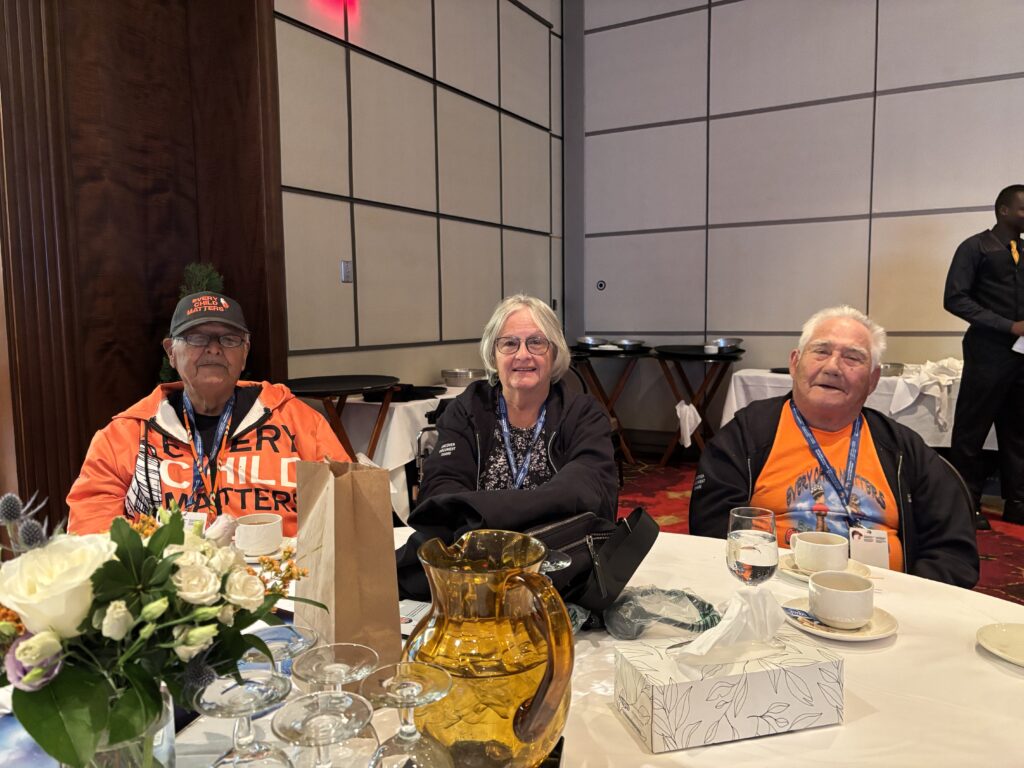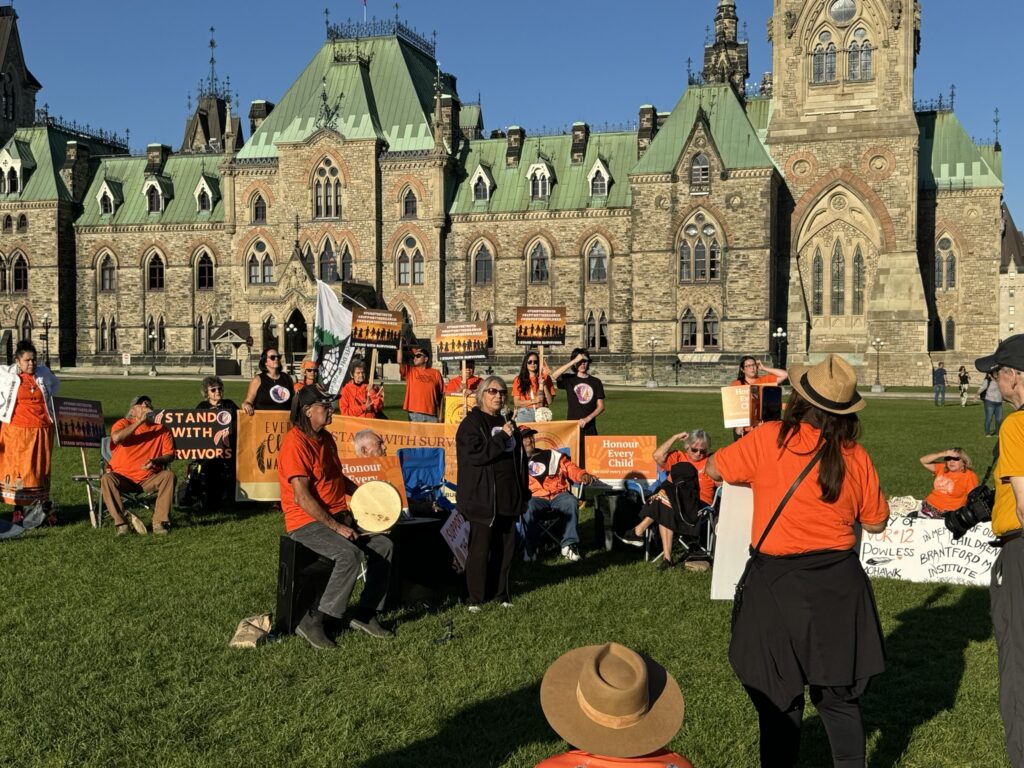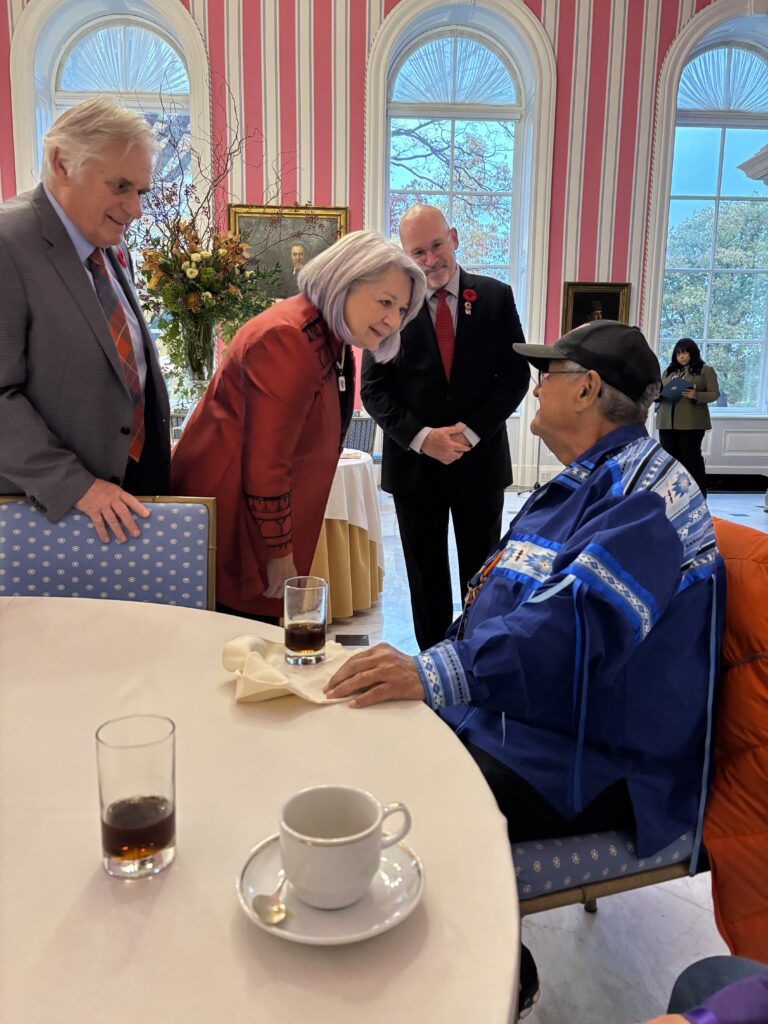In late October, the Survivors’ Secretariat attended a two-day National Gathering held by the Office of the Special Interlocutor (OSI) for missing children and unmarked burials associated with Indian Residential Schools (IRS) in Canada.
This event marked the conclusion of the OSI’s two-year mandate, during which the office engaged with Survivors and Indigenous communities across the country. At the gathering, the final report, Upholding Sacred Obligations, was formally presented to Arif Virani, the federal Minister of Justice and Attorney General of Canada, in Gatineau, Quebec, on the unceded territory of the Algonquin, Anishinaabe people.
This comprehensive report shares the result of two years of intensive engagement with Survivors, and their communities nationwide. It outlines the legal, moral, and ethical obligations Canada must fulfill to address the gaps in identifying, protecting, and commemorating missing children and their unmarked graves.

One of the key findings of the final OSI report, which spans over 1,000 pages, is that the children who died and were buried at Indian Residential Schools were not simply missing but were forcibly disappeared by the state. This, Murray asserts, constitutes a crime against humanity, specifically “enforced disappearance,” under international law.
The report also emphasizes that Canada is still withholding essential records from Indigenous communities that would help identify where the children were moved, where they died, and where they are buried. Murray highlighted frequent crimes against humanity (COH) that occurred in Indian Residential Schools, including Survivors’ accounts of babies being burned in incinerators and children subjected to medical experiments.
Murray has submitted her report to the International Criminal Court, where it could become the first case of enforced disappearances being recognized as an ongoing crime, potentially setting a precedent for recognizing Indigenous families and communities as victims of these actions.
We cannot ignore the lasting impact of the Indian residential school system and the pain it has caused to Indigenous peoples. The harmful legacy of residential schools, which is one of lost [disappeared] children, languages and cultures, lost opportunities to thrive, grow and live full healthy lives and silenced truths, continues to be deeply felt today and cannot be denied.
Arif Virani, Minister of Justice and Attorney General of Canada.
About the Office of the Special Interlocutor
In June 2022, Kimberly Murray was appointed as the Independent Special Interlocutor for a two-year term by Canada’s Minister of Justice. Her role involved engaging with Survivors, Indigenous families, and communities to support the recovery of missing/disappeared children and uncovering unmarked burials. The OSI’s mandate included reviewing existing laws at the federal, provincial and territorial levels, while developing a comprehensive federal legal framework.
Throughout the OSI’s two-year mandate, the Interlocutor has released several reports, culminating in the final report: Upholding Sacred Obligations. The two-volume report outlines the 42 legal, moral and ethical obligations churches, and the Canadian government must uphold in accordance with United Nations Declaration on the Rights of Indigenous Peoples (UNDRIP), Indigenous laws, international human rights/criminal law and Canadian constitutional law.
The Final Report examined four elements of reparation that when woven together form the foundation of an Indigenous-led Reparations Framework for truth, accountability, justice, and reconciliation:
- Activating and enforcing international obligations;
- Implementing Indigenous laws and decolonizing the Canadian legal framework;
- Finding truth, repatriating lands, and repatriating the children; and
- Supporting Indigenous-led healing and countering settler amnesty.
The Special Interlocutor focused on legal and moral obligations, using the term ‘obligations’ over ‘recommendations’ because the government has often ignored the latter. These children died under the care of the Canadian State, and by framing them as obligations, Murray emphasizes that the federal government must acknowledge its responsibility to address these wrongs.
Obligations
The final report outlines ‘42 obligations’ which provides an extensive overview of how Canada can address the legacy of Indian Residential Schools, some of the key findings include:
- Obligations for Reparations and Recognition: Secure stable, long-term, and flexible funding for search efforts, provide full reparations and compensation for the families or descendants of missing/disappeared children.
- Call for International Action: Canada should refer the disappearance of children from Indian Residential Schools to the International Criminal Court as a crime against humanity.
- Criminalizing Denial of Residential Schools: Calls for the federal government to criminalize the denial of Indian Residential Schools, which involves distorting or misrepresenting their history to undermine the testimony of Survivors.
- Cultural Impunity/Amnesty: This impunity is referred to as “settler amnesty” in the report, describing implicit amnesty granted by the government to those responsible for crimes against Indigenous children.
- Protection of Burial Sites: Return land linked to former Indian Residential Schools and burial sites to Indigenous Peoples. There has been a lack of federal legislation that supports the protection of burial grounds.
This report expands on the work of the National Truth and Reconciliation Commission of Canada (NTRC), which devoted an entire volume of its final report to the issue of missing children and unmarked graves. The NCTR Calls to Action were released in 2015 and despite its slow progress, fundamental questions about the missing children, such as who they were, why they died, and where they are buried remain largely unanswered and undocumented by the Canadian government.
The 2024 Funding Shortfall
While the federal government has acknowledged the significant work done by the Office of the Special Interlocutor (OSI) and its mandate, major concerns such as the current lack of funding for the 2024-2025 fiscal year remain.
Survivor organizations across the country remain in limbo, further highlighting the gap between the government’s verbal commitments and the financial support needed to fulfill them. This funding shortfall highlights the urgent need for adequate resources to support the work of truth, justice and healing for Survivors, Indigenous communities and the people of Canada.
Nearly 8 months into the fiscal year, new funding has yet to flow to Survivor organizations leading the search into missing children and unmarked burials. Many organizations have reported they have paused planned projects or ceased operations entirely until funding is approved and received.
The Survivors’ Secretariat was forced to pause key projects, including the Mohawk Village Memorial Park installation and our Data Sovereignty initiatives and is currently operating on carry-over funds from paused projects.

Survivors Dedication
A key theme of the gathering was the acknowledgment and support of Survivors, who for decades have courageously shared painful truths about their lived experiences at Indian Residential Schools, often in the face of being ignored. Survivors continue to be at the forefront of this ongoing work, serving as living witnesses to this dark chapter in Canada’s history.
As Independent Special Interlocutor Kimberly R. Murray stated,
The greatest and most important obligation we all have is to the Survivors, who must be honoured and acknowledged for their courage in raising awareness about the painful truths of unmarked burials at Indian Residential Schools and other associated institutions.
As Survivors, Indigenous families, and hundreds of Indigenous communities continue to work towards the respect and dignified treatment of the children’s bodies and spirits, we are reminded of our shared commitment to truth-telling, justice and reconciliation. Survivors’ truths continue to compel us to confront the shadows of history and work towards a future built on healing, understanding, and unity.

The Survivors’ Secretariat remains steadfast in our commitment to advocate for tangible actions and solidarity with Survivor organizations across the country. Kimberly Murray’s words serve as a powerful reminder that the work of justice, healing, and reconciliation must persist. We call on all government bodies to honour their commitments and move forward with urgency, accountability, and unwavering dedication to the Survivors and their communities. The time for meaningful action is now.
The Secretariat also extends a heartfelt Nia:weh, Office of the Special Interlocutor and to all Survivors across Canada and their communities who are conducting search efforts for the children who never returned home.
The Survivors’ Secretariat will further explore the key themes outlined in the OSI’s Final Report in future blog posts. Subscribe to our newsletter to have these posts sent directly to your inbox. As new blogs are posted we will update this post with links to consecutives blog posts.
In our next blog we will explore denialism.
See the links below to read the statement from Indigenous Organizations acknowledging the OSI’s findings.
AMC Acknowledges Independent Special Interlocutors Final Report – Assembly of Manitoba Chiefs
Services Available to Survivors, and Intergenerational Survivors:
If you require immediate support, please contact the Hope for Wellness Help Line at 1-855-242-3310 to access toll-free, 24/7 counselling and crisis intervention. Hope for Wellness Help Line offers immediate mental health counselling and crisis intervention to all Indigenous peoples across Canada. Experienced Helpline counsellors, many are Indigenous, can help if asked to find wellness supports that are available in your area.
The Indian Residential Schools Crisis Line (1-866-925-4419) is available 24 hours a day for anyone experiencing pain or distress as a result of their residential school experience.